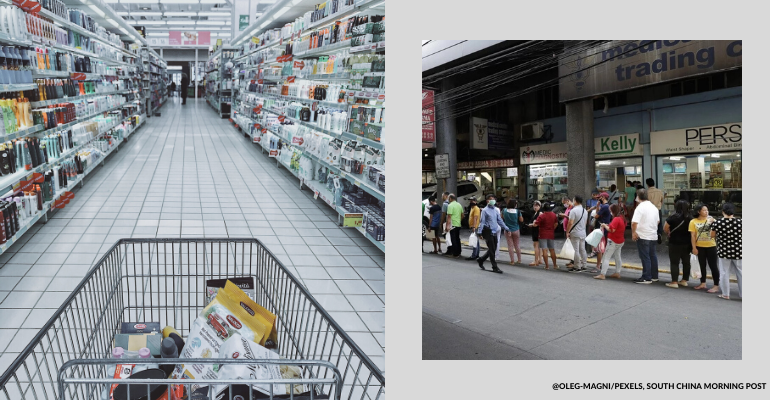“Sabi ni kuan, mag lockdown na so dapat mag bili na tayo ng supplies!”
As of Thursday, the number of coronavirus diseases 2019 (COVID-19) confirmed cases in the Philippines rose to 49. With this, Filipinos are now starting to worry, especially those who live within the areas of confirmed cases.
Fueled by fake news and hearsays, two known recipes for intensifying anxiety and panic, anxious citizens now flock to groceries and supermarkets to hoard essential goods, such as rubbing alcohol, toilet papers, and face masks.
Consequently, the artificial shortage gives manufacturers a hard time to keep up with the sudden surge of demand from the consumers. Moreover, only those who belong to the wealthy and middle-income shoppers are able to purchase, leaving little to none for those who can’t afford it.
PANIC ALL OVER THE GLOBE
Panic buying is a phenomenon that happens in times of crisis that can drive up prices and take primary goods out of the hands of people who need them most.
While most would say hoarding is simply a way of preparing for the unknown fate, most experts would say this is all but a consequence of irrational panicking. And a lot of countries are currently suffering from this as a consequence of the continuous rising of COVID-19 cases.
For instance, Singapore Prime Minister Lee Hsien Loong had to assure the public that there is enough supply of rice and instant noodles after the mass demand. In Auckland, New Zealand’s supermarket spending soared up to 40 percent last Saturday compared to the same day in 2019. Lastly, Malaysian shoppers have hoarded groceries, stocking their kitchen with goods until the crisis dies down. All places mentioned have confirmed cases of COVID-19.
BUT WHY DO PEOPLE DO IT?
According to experts, the answer boils down to the fear of the unknown, not knowing what to do or what lies ahead. Also, in believing that a response to a dramatic event should also be dramatic—even though the only things we needed to do is as mundane as washing our hands properly.
“Panic buying has no place in society. Once it happens, those who have money will be able to stock up, and those who have less will not be able to buy the things they need,” Philippine Amalgamated Supermarkets Association President Steven Cua said in an interview with CNN Philippines.
NO NEED TO PANIC
In another interview with CNN Philippines, Trade Secretary Ruth Castelo reassures the public that there is no need to panic.
“Wala namang dahilan para mag panic tayo and bumili, mag hoard nitong mga supplies na ‘to dahil marami naman mga supply ang manufacturers,” Castelo said.
(We don’t have any reason to panic and buy, to hoard supplies because manufacturers have enough.)
“Kung makakakita kayo ng medyo empty shelves, ibig sabihin lang nuon kailangan pa nilang mag replenish,” she added, encouraging everyone not to cause alarms and panic.
(If you see empty shelves, it only means they need to replenish.)
Moreover, DTI has already coordinated with grocery and supermarket owners to keep the hoarding situation at bay. They also recommended limiting the number of items consumers can purchase, specifically two items per consumer.
Castelo explained that people can only acquire two bottles of each type of alcohol or disinfectant “regardless of size. DTI will also strictly monitor resellers.
Aside from Castelo, DTI Secretary Ramon Lopez also guarantees the public that there is enough supply of items like tissue papers, sanitizers, and alcohol.
“Walang dahilan para mag-panic buying. Lalong nagki-create ng artificial shortage ‘yan lalo na sa araw na iyon,” Lopez said.
(No need to panic buying. It will only create artificial shortage especially in times like this.)
PRICE FREEZE
Following the State of Public Health Emergency declaration of President Rodrigo Duterte, the Department of Trade and Industry (DIT) ordered a price freeze to all basic commodities amid the COVID-19 outbreak in the country.
Under proclamation no. 922, all prices of basic goods in the country will be frozen for the next 60 days.
TAKE A PAUSE AND A BREATHER
Instead of letting the panic get the best of you, start by taking a pause—a breather.
Educate yourself by reading reliable sources. Avoid fake news by visiting your trusted media websites or watch television news instead. It doesn’t mean you are not panicking, you are being complacent already. Besides, having high levels of anxiety isn’t useful in times of crisis.
Knowing what you need to prepare for will steer you away from panic and hysteria. By being calm, you’ll know what essentials to buy and how many will be enough for you and your loved ones.
—
According to the John Hopkins University COVID-19 Tracker, over 126,000 people have already been infected since the outbreak began in Wuhan City last December 2019. COVID-19 took away more than 4,600 lives, mostly from China. Nevertheless, at least 68,200 infected people have recovered from the disease.
Furthermore, the World Health Organization (WHO) announced Wednesday that COVID-19 is now considered a pandemic.
SOURCE
- Hilotin, J. (2020, March 11). Panic buying, price gouging reported in Manila over coronavirus. Gulf News. Retrieved on March 12, 2020, from https://gulfnews.com
- Lufkin, B. (2020, March 5). Coronavirus: The Psychology of Panic Buying. BBC. Retrieved on March 12, 2020, from https://www.bbc.com
- Santos, E. (2020, March 12). DTI order: Sell only two bottles of alcohol, disinfectants per person. CNN Philippines. Retrieved on March 12, 2020, from https://cnnphilippines.com

Leave a Reply